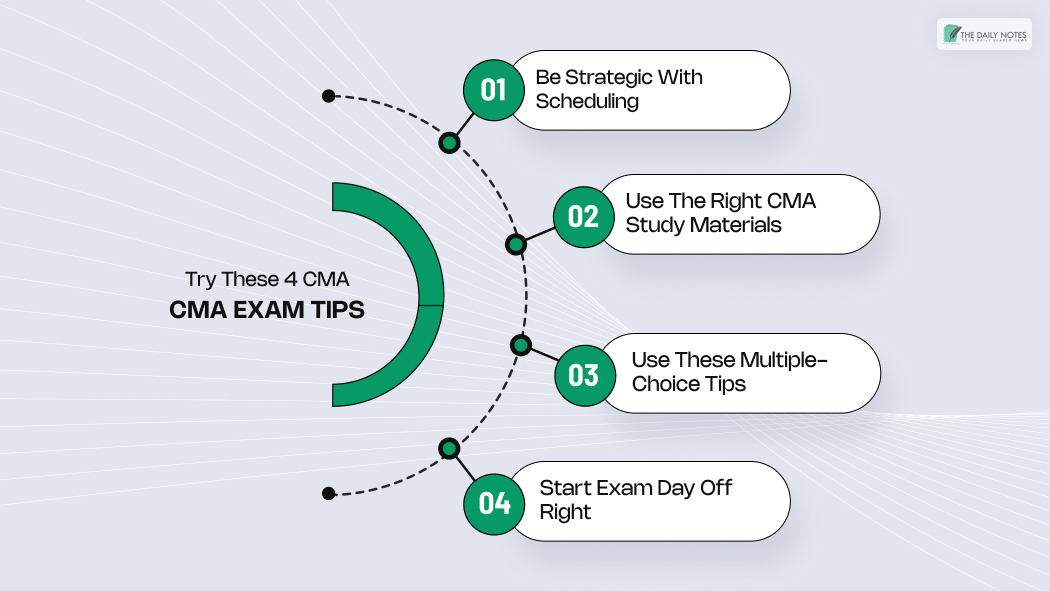When it comes to the CMA exam, you want to make sure you’re putting your time, energy, and mental resources into the right places. So rather than taking a shotgun approach to study, why not develop an intentional process that sets you up for success on exam day?
What are the CMA Exams?

The CMA exam or certified management accountant exam is a professional certification that demonstrates expertise in financial management and management accounting. The Institute Of Management Accountants or IMA offers this exam which is globally recognized as a prestigious qualification for financial professionals accountants and those in related fields.
While preparing for the CMA exam, remember it consists of two parts and a candidate must pass both to earn the CMS certification. Each part covers significant areas of management and finance accounting knowledge.
The first part of the exam focuses on analytics, financial planning, and performance. Under this topic such as planning, budgeting, forecasting, external financial reporting decisions, performance management, cost management, internal controls, and technology and analytics.
The second part of the exam focuses on strategic financial management. Under this, topics such as corporate finance, financial statement analysis, decision analysis, investment decisions risk management, and professional ethics are included.
Each part of the CMA exam has 100 multiple-choice questions and two essay questions. Candidates get 4 hours to complete each part of the exam with 3 hours for the multiple-choice section and one hour for the essays.
For you to receive CMA certification a score of at least 360 out of 500 is necessary in each part.
You must have an IMA membership before you register for the CMA exam.
Try These 4 CMA Exam Tips

The CMA exam is one of the more challenging exams in the accounting industry. However, the formula for passing the exam is no secret. If you do the following, you’ll dramatically improve your odds of passing:
1. Be Strategic With Scheduling
There are two parts to the CMA exam. You’re required to pass both to obtain your CMA. The first part of the test requires you to prove your knowledge of financial planning, reporting, control, and performance.
The second part of the exam is all about financial decision-making. Part one and part two are taken in separate sittings.
Strategic scheduling is a must if you want to maximize your time. There are only three two-month periods where both exams are given. (January/February, May/June, and September/October)
One of the best approaches is to schedule part one for the beginning of the first month and part two for the end of the second month. This gives you plenty of time to study, while also enabling you to complete both within a relatively condensed period.
2. Use the Right CMA Study Materials
You can increase your chances of passing the CMA exam the first time around by selecting the right CMA study materials. And while there are dozens of reputable online courses, not all are created equal.
We recommend choosing a course like Wiley CMA, which uses advanced features like predictive scoring and personalized exam prep to help each student study with their own strengths and weaknesses in mind.
This unique approach ensures you aren’t just recycling the same content that you already know. It forces you to address those topics and questions that trip you up, which is better in the long run!
3. Use These Multiple-Choice tips
Knowing how to answer multiple-choice questions is one of the keys to having a successful CMA exam day. And while it all comes down to knowing the content, here are some simple tips you can use to improve your results:
- Always read the question through once. Then go back and re-read the question by splitting it into parts. There’s usually a “stem” and supplemental details. (Be on the lookout for words like not, false, except,)
- Often, an answer will immediately jump off the page. Make a mental note of your first instinct. (You’ll eventually choose this one if you’re unable to reach a more educated conclusion.)
- Answer every question the first time around. Never leave an answer blank. You can always come back and review it later. By answering the question, you give yourself a 25% chance of getting it right.
- It’s usually possible to eliminate at least one answer. If you can eliminate two right off the bat, you now have a 50-50 shot of getting it right. Use elimination as a strategy for enhancing focus and clarity.
Using these suggestions, you’ll find that multiple-choice questions aren’t nearly as intimidating as they initially seem.
4. Start Exam Day off Right
It might seem like a small detail, but how you handle the morning of exam day will have a noticeable impact on your focus and performance on the day of the test. Suggestions include:
- Wake up with plenty of time to spare. (Give yourself at least an hour more than you typically would.)
- Eat a substantial and healthy breakfast. (Opt for fresh food over processed and sugary options.)
- Cramming won’t do you any good at this point, but you can review a few key study points just to get your brain thinking about the subject matter at hand.
- Arrive at the exam testing center with ample time to spare. Practice breathing exercises while you wait. (This calms the mind and helps you focus.)
Everyone’s morning routine will look a bit different, but this at least gives you an idea of some key action steps that are worth replicating. The goal is to remain focused and avoid feeling hurried or stressed.
Set Yourself Up for Success
Perspective is everything while preparing for the CMA exam. Preparing to take the exam can be time-consuming and costly, personally and financially. You’ll sacrifice a lot of resources in studying for the exam; however, it’s all worth it in the end. When it’s all said and done, CMAs earn significantly more (with average salaries somewhere between $120,000 and $140,000 per year) and enjoy far greater opportunities.
So as frustrating and repetitive as it feels in the moment, you must keep the big picture in mind. It’ll be worth it!
Read Also:




























